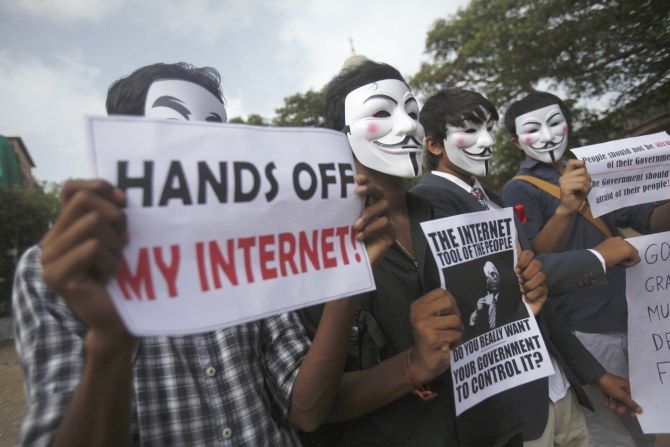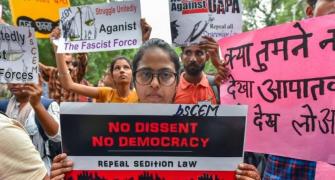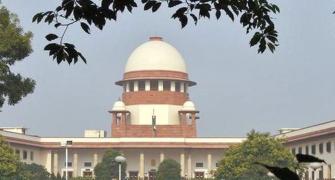'The cases have not reduced because the prosecution has found some other way to stop people from using their right to free speech.'

It was in 2015 that the Supreme Court of India scrapped Section 66A of the IT Act, giving relief to all Indians who believe in freedom of speech.
The impugned section stated that any electronic mail or message for the purpose of causing annoyance or inconvenience or to deceive or to mislead the addressee or recipient about the origin of such messages, shall be punishable with imprisonment for a term which may extend to three years and with fine.
Section 66A came into prominence after a young woman from Palghar in Maharashtra, Shaheen Dhada, was arrested in November 2012. She had posted an update on her Facebook page criticising the bandh imposed by the Shiv Sena after the death of its party supremo the late Bal Thackeray.
Rinu Srinivasan, Shaheen's friend, too was arrested under Section 66A of the IT Act after she merely 'liked' the Facebook post.
Public outrage compelled the then Maharashtra government and the state police to quash the case against them.
The Information Technology Act was enacted in 2000 when the Internet was still relatively new in India.
As the use of social media and Web sites grew, the misuse and abuse of platforms too grew and therefore Section 66A was inserted into the IT Act.
Finally, a law student, Shreya Singhal, challenged Section 66A arguing that it curbed Freedom of Speech and Expression and violated Fundamental Rights guaranteed under Articles 14, 19 and 21 of the Constitution.
In 2015, then Supreme Court judges Justice Jasti Chelameswar and Rohinton Fali Nariman stated that the section violated Articles 19 (the Right to Freedom of Speech and Expression) and Article 21 (Right to Life) and scrapped it.
Seven years later after the Supreme Court judgment, many cases are still being filed under this dead section and arrests are being made leading the People's Union for Civil Liberties approaching the apex court.
In its PIL, PUCL revealed 40 cases under Section 66A of the IT Act are pending before courts in Jharkhand.
In Madhya Pradesh, the state machinery has taken cognisance of 145 cases and out of these, 113 are pending in courts.
Senior Advocate Sanjay Parikh, who appeared for PUCL, scored a major victory when the apex court ruled that all cases under Section 66A of the IT Act have to be withdrawn in three weeks.
Syed Firdaus Ashraf/Rediff.com spoke to Mr Parikh on why Section 66A continued to be invoked, seven years after it was scrapped by the highest court in the land.
The Supreme Court wants all the cases under Section 66A of the IT Act to be scrapped within three weeks. Can you tell us how many cases are registered under this Act after this section was scrapped in 2015?
I don't have the exact number as to how many cases are registered under Section 66A post March 2015 right now because there are many affidavits filed from different states. But I can tell you for sure that there are more numbers of cases than what we pointed out in our petition.
Were the various state police forces not aware that Section 66A had been scrapped by the Supreme Court in March 2015?
When a judgment is delivered, then usually it is reported in newspapers. And not all the judgments are sent to high courts of different states and to all the police stations or chief secretaries of the country for implementation.
So, the police follows normal procedures (without knowing that Section 66A has been scrapped).
In the statute book of India, this law, Information Technology Act and 66A exist. Therefore, they (the government) must write down in the statute book that 66A of the IT Act has been struck down by the Supreme Court of India judgment on such and such date.
These are some of the reasons why prosecution of people under Section 66A continued and trials too proceeded.
But when we came to the Supreme Court of India, we were told by the attorney general that the government on its part wrote a letter to all the chief secretaries of states and to the high courts.
Now in spite of this letter being sent we found out that cases under Section 66A were still being registered and their numbers increasing so we filed another application in this matter (to stop misusing Section 66A).
And now, the Supreme Court has told the Union of India to appoint an advocate who will communicate with all the chief secretaries of the states and ensure the cases under Section 66A are withdrawn or wherever they are pending they are quashed.
But seven years is a very long time. How come the state governments still charged people under this section in spite of the section being scrapped in 2015?
Yes, it is a very long time. And it really throws light on the poor manner in which even our Supreme Court of India's judgments are implemented.
The Supreme Court not only struck down Section 66A but also gave directions to implement their ruling, and yet cases were registered (across the country).
It is a poor reflection on the rule of law. I pointed this out to the court.
Therefore, I told the Supreme Court, they must come out with guidelines on this matter like we mentioned about the D K Basu case where it talks about guidelines of arrest and the Arnesh Kumar case where it says you cannot make arrest in certain cases -- even those things are not being followed by the police.
We saw Marathi actress Ketaki Chitale getting arrested in Maharashtra when she commented in a social media post against Sharad Pawar. The police removed Section 66A of the IT Act from the case diary only after there was a hue and cry.
Didn't people across the country protest when they were wrongfully getting arrested under Section 66A?
Even NGOs try to spread this information and even the organiSations supporting PUCL they were also getting in touch with people against whom cases were registered under Section 66A.
But then, it is not possible for us to reach each individual across the country against whom cases are registered under Section 66A of the IT Act.
Many a time in far-off remote villages cases were registered under several sections of the IPC (Indian Penal Code) and then they add Section 66A of the IT Act too.
In some cases we found the police continued with Section 66A knowingly and felt they will remove it when someone points it out to them.
I don't know whether this was done due to political reasons, but the fact is that it was done and it was plain harassment.
It is surprising that this kind of illegal arrest under Section 66A went on for so long without anyone noticing it until PUCL stepped in.
That is why it is necessary that the judgments of importance touching civil life and which have consequences on the rights of people, they should be crystallised and circulated.
There should be directions issued to authorities to act in a particular way, but that doesn't happen.
Do you think after the Supreme Court ruled on Section 66A in PUCL's favour, the people of India will be able to freely express their views against politicians on social media? Will we be a more free society?
Even today if you have something to say or criticise within the parameters of the Constitution, there is no bar.
You can criticise the public authority or government if you have facts with you and you feel that is the correct thing to do.
The problem is because of political power if the police takes some kind of action against you and arrests you, then you get into a difficult situation.
Because the police can put sedition charges against you and then it is for you to keep on proving that your act (on social media) does not fall under sedition.
After which it takes months and years for the court to look into your matter.
But there is no bar because the Constitution of India gives you that Right of Freedom of Speech and Expression.
Because human rights is about free speech, and if Section 66A is gone, then the sedition sword is always hanging on you over free speech.
That is a problem because the conviction rate is very low. It was 3 percent (in 2019), 33% in 2020.
And in cases of TADA (Terrorist and Disruptive Activities (Prevention) Act), the conviction rate was a mere 1 percent.
It means cases are foisted on people only to take away their freedom of speech and expression.
When the court finds there is nothing in the case, they are acquitted.
This is the abuse of police power when they put a case against somebody and that person is harassed for a long time.
There should be some mechanism when an FIR is launched against somebody in such cases, to look at facts and point out that no offence is made out.
And nobody should be able to take political advantage of such cases.
There should be some ombudsman from the judiciary side looking into such cases.
Is it a long battle ahead for free speech?
Yes, because if Section 66A of the IT Act goes, then something else will come.
Despite Section 66A being struck down have the cases reduced?
No, the cases have not reduced because the prosecution has found some other way to stop people from using their right to free speech.










